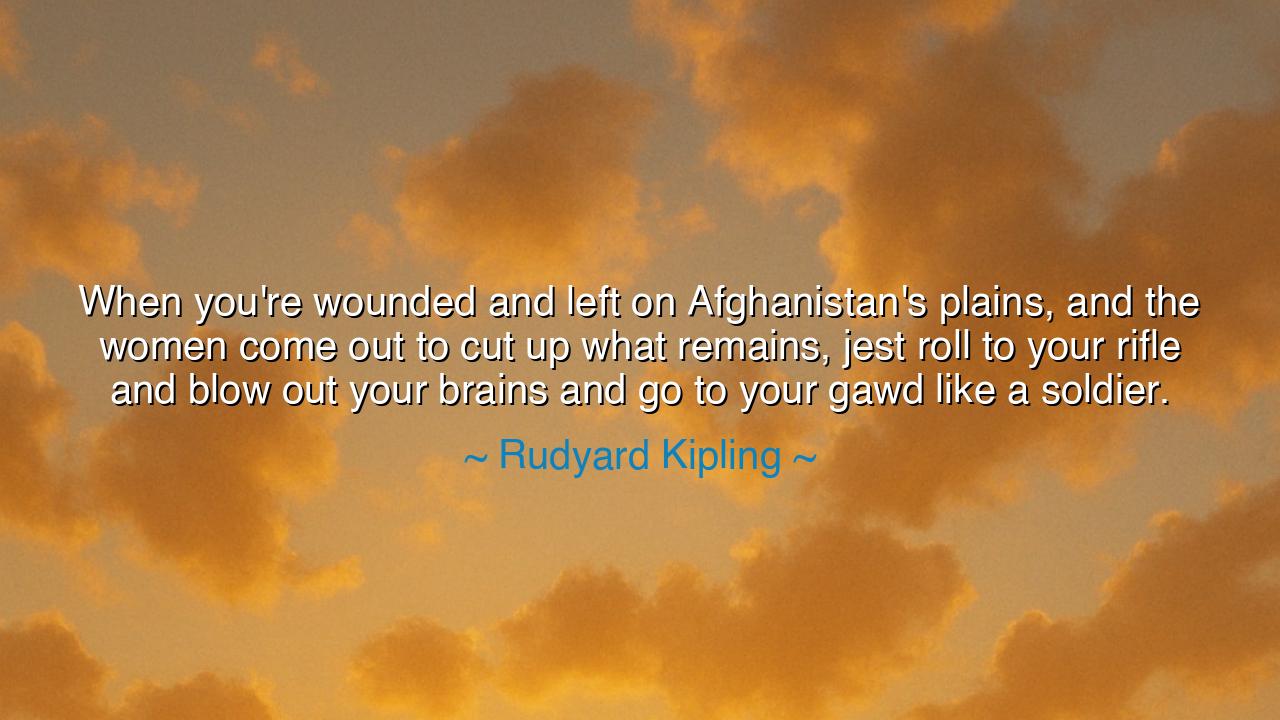
When you're wounded and left on Afghanistan's plains, and the
When you're wounded and left on Afghanistan's plains, and the women come out to cut up what remains, jest roll to your rifle and blow out your brains and go to your gawd like a soldier.






The words of Rudyard Kipling — “When you’re wounded and left on Afghanistan’s plains, and the women come out to cut up what remains, jest roll to your rifle and blow out your brains and go to your gawd like a soldier.” — carry the raw weight of empire, war, and mortality. They are not gentle verses but brutal ones, meant to harden the spirit and remind men that in the theater of battle, mercy cannot be assumed, and death must often be met with grim resolve.
Kipling wrote of the Afghan plains during the late 19th century, when Britain fought the Anglo-Afghan Wars. These were campaigns where soldiers found themselves in a land of fierce resistance, where even death did not bring dignity, for enemy women, hardened by centuries of invasion, would desecrate the bodies of the fallen. In this setting, Kipling exhorted the soldier to embrace his fate: if death is certain, let it be chosen on one’s own terms, with a rifle in hand, and a final act of defiance.
The brutality of this verse recalls the ancient warrior codes. The Spartans at Thermopylae knew they would be cut down by the Persians, yet they chose to die on their own shields rather than flee. The samurai of Japan, faced with defeat, turned to seppuku, preferring self-determined death to dishonor. Kipling’s soldier, too, is urged to claim the dignity of choice — to meet his gawd as a soldier, not a helpless victim.
Yet beneath the hardness lies another truth: the horror of imperial war, where the cycle of violence strips men of humanity, leaving only the bare will to survive or die with a shred of control. In placing these words in the mouths of soldiers, Kipling did not glorify suffering, but showed its starkness. The verse is at once heroic and tragic, reminding us that the cost of empire is paid in blood and despair on foreign soil.
Let the generations remember: in war, the veneer of civilization is torn away, and men must decide how they will face the inevitable. Kipling’s words, shocking and unflinching, teach us that courage is not always triumphant victory, but sometimes the bitter resolve to meet death standing rather than broken. To “go to your gawd like a soldier” is to cling to identity even in ruin — a lesson both haunting and eternal.






LPLinh Phuong
While Kipling’s quote might resonate with some as a form of poetic valorization of sacrifice, it also raises deeper questions about how we view soldiers and death. Is the act of dying 'like a soldier' truly noble, or is it just a tragic, unavoidable end of a brutal reality? This quote makes me reflect on how we glorify certain aspects of war and sacrifice without truly addressing the horror and aftermath that soldiers face.
BHbao han
Kipling's quote presents a soldier’s death in a way that seems heroic, yet in such a detached, grim way. The idea of ending it all by 'blowing out your brains' feels almost nihilistic. It makes me wonder how Kipling reconciled these stark images of death with his personal experiences, especially considering his patriotism. Did he see war as an honorable duty, or was he critical of the sacrifices demanded from soldiers?
GDGold D.dragon
The rawness of this Kipling quote makes me uncomfortable, especially the depiction of women coming to 'cut up what remains.' It almost objectifies the brutality of the battlefield and dehumanizes both the soldier and those witnessing the aftermath. I’d like to ask—what was Kipling trying to say about the dignity of a soldier's death? Was this an expression of valor, or was it something more critical of the human cost of war?
THDo Thi Hanh
There’s something haunting about this quote—the idea of being abandoned on the battlefield, with death as the only dignified escape. Kipling seems to offer death as a final, noble act, but it feels like it overlooks the trauma that soldiers carry with them. I wonder how Kipling’s own views on war influenced this depiction. Is this quote a reflection of the era's glorification of military sacrifice?
HGHuy Gia
The imagery in this quote is stark and unsettling. Kipling's words seem to glorify the idea of dying 'like a soldier,' yet it also suggests a resignation to violence and death as an inevitable part of war. What does it mean to die 'like a soldier'? Is this supposed to evoke honor, or is it simply a grim acceptance of fate? I find myself questioning the values that this quote reinforces.